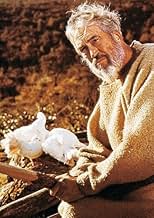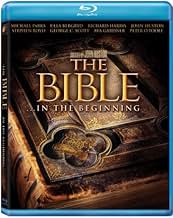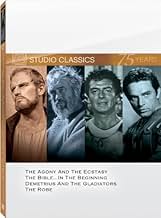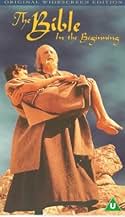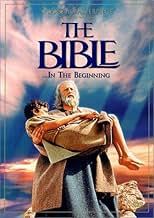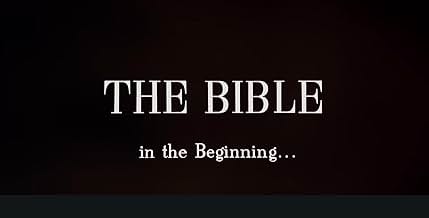La Bible : Au commencement des temps...
Original title: The Bible in the Beginning...
- 1966
- Tous publics
- 2h 54m
IMDb RATING
6.2/10
6.7K
YOUR RATING
Extravagant production of the first part of the book of Genesis. Its main highlights are the Garden of Eden, the first brothers, Noah and his family obeying God to build an ark for the Flood... Read allExtravagant production of the first part of the book of Genesis. Its main highlights are the Garden of Eden, the first brothers, Noah and his family obeying God to build an ark for the Flood and Abraham's attempted sacrifice of Isaac.Extravagant production of the first part of the book of Genesis. Its main highlights are the Garden of Eden, the first brothers, Noah and his family obeying God to build an ark for the Flood and Abraham's attempted sacrifice of Isaac.
- Nominated for 1 Oscar
- 6 wins & 5 nominations total
Maria Grazia Spina
- Daughter of Lot
- (as Grazia Maria Spina)
Featured reviews
Just a year after his triumph in "Becket", Peter O'Toole is almost unrecognizable but does high class work as the Angel of the Lord--he's **trium in uno**--opposite Abraham and Sarah as portrayed by Ava Gardner and George C. Scott. These two great but very different actors play wonderfully off one another--Scott's earthy energy against the elegant tones and sorrowful eyes of O'Toole--who is on his way to destroy the sin cities of Sodom and Gommorah with all their inhabitants.
The other fine portrayal is of Nimrod, "a mighty hunter before the Lord", by the late actor Steven Boyd. In a single, four minutes scene he captures all the kingly hubris of this biblical figure-- the first in the book of Genesis who does not represent a nation. He who built the Tower of Babel, and saw it destroyed.
Children would be entertained by the carnival of the animals sequence depicting Noah and the Ark.
The other fine portrayal is of Nimrod, "a mighty hunter before the Lord", by the late actor Steven Boyd. In a single, four minutes scene he captures all the kingly hubris of this biblical figure-- the first in the book of Genesis who does not represent a nation. He who built the Tower of Babel, and saw it destroyed.
Children would be entertained by the carnival of the animals sequence depicting Noah and the Ark.
I've always noticed an interesting trend among critics when they review a Biblical movie. Since most critics are of a skeptical nature, they usually carry with them the bias that unless the movie deviates from a traditional telling of what the Bible says it is somehow dull cinema. That somehow there can't be anything compelling in seeing the stories of the Bible dramatized in a straightforward manner with no inane attempts to "humanize" the tales through the lens of a modern, secular society.
Well, I make no apologies for being one of the devout and saying that I prefer my Bible stories straight, without any modernistic elements that are meant to make hidden slams at why the stories are important to begin with. For me, "The Bible" is one of the best Biblical epics precisely because it takes its subject material seriously and only alters a few details (Nimrod for instance is not identified as the king at the time of the Tower of Babel) to get a coherent cinematic presentation in place. Christopher Fry, whose uncredited rewrite of "Ben Hur's" screenplay helped make that film a literate masterpiece of cinema brings the same touch here. And Huston does a fine job of directing.
Those who bash this film, much like those who are given to bashing movies like "The Greatest Story Ever Told" while praising garbage like "The Last Temptation Of Christ" are often saying more about themselves than they are about the film they've just reviewed. What they regard as "boring" I regard as a noble effort to give a visual understanding to the events of the Bible. And "The Bible" despite only covering the first half of the book of Genesis succeeds brilliantly at it.
Well, I make no apologies for being one of the devout and saying that I prefer my Bible stories straight, without any modernistic elements that are meant to make hidden slams at why the stories are important to begin with. For me, "The Bible" is one of the best Biblical epics precisely because it takes its subject material seriously and only alters a few details (Nimrod for instance is not identified as the king at the time of the Tower of Babel) to get a coherent cinematic presentation in place. Christopher Fry, whose uncredited rewrite of "Ben Hur's" screenplay helped make that film a literate masterpiece of cinema brings the same touch here. And Huston does a fine job of directing.
Those who bash this film, much like those who are given to bashing movies like "The Greatest Story Ever Told" while praising garbage like "The Last Temptation Of Christ" are often saying more about themselves than they are about the film they've just reviewed. What they regard as "boring" I regard as a noble effort to give a visual understanding to the events of the Bible. And "The Bible" despite only covering the first half of the book of Genesis succeeds brilliantly at it.
Seemingly eposodic, there is little segue between the "stories." Even the title is misleading, since this film only covers from Creation through the story of Abraham - the first 22 chapters. But if the whole book was made into a movie it would be 162 hours at this rate. Too long for most audiences! (Hint - hint - miniseries).
Most of the acting comes across as stilted, except Huston, who's tongue-in-cheek portrayal of Noah wavers between refreshing and cloying. The highly touted "nude" scene of Adam and Eve may have raised a few eyebrows in 1966 but seems pretty tame by today's standards thanks to a few well-placed fern fronds. Scotts's rendering of patriarch Abraham was strong but uninspired.
This pic is adequate if you're not looking for in-depth religious interpretations. More could have been done with characterizations, but in the time given, was satisfactory. Just watch and enjoy for its face value.
Most of the acting comes across as stilted, except Huston, who's tongue-in-cheek portrayal of Noah wavers between refreshing and cloying. The highly touted "nude" scene of Adam and Eve may have raised a few eyebrows in 1966 but seems pretty tame by today's standards thanks to a few well-placed fern fronds. Scotts's rendering of patriarch Abraham was strong but uninspired.
This pic is adequate if you're not looking for in-depth religious interpretations. More could have been done with characterizations, but in the time given, was satisfactory. Just watch and enjoy for its face value.
This film was released in September of 1966, which placed it at the close of a long tradition of Hollywood Biblical epics. I was around ten years old and had a vinyl LP of its great musical score which I played over and over before I finally saw the movie on the big screen of a theater. Our family was not particularly religious, but this film was one of those that had a profound influence on me and made me interested in knowing more about the Bible.
Looking at it today, I see more depth. The opening footage from all over the world of the days of the Creation is still breathtaking. As a child I felt uncomfortable with the partially nude scenes of Adam and Eve, and even now I believe nudity needs to be implied. Otherwise my mind stops focusing on the story and thinks "I just saw a naked actor!". Also, a theory of some Bible commentators is that animals are clothed with feathers or fur, and Adam and Eve were clothed with a glow of light emanating from within them. When they sinned that glow disappeared and they were then totally naked before they hit on the idea of fig leaves. (This interpretation would not likely have been known to John Huston). Beyond that, the film rolls on quite nicely through the first twenty-two chapters of Genesis. The cinematography is rich and beautiful. I do think a few too many scenes were interpreted as desert settings, since many of the Bible lands were lush and only outskirted by desert as a result of the climatology of the region being somewhat different more than 4,000 years ago (though of course that's controversial). Either way the storyline still follows the episodes of salvation history. One reviewer said it looks like they just kept shooting until they ran out of film and decided to call it quits. To me it was essential they kept going until they climaxed the film with the sacrifice of Isaac, which pointed forward to the day when God would inaugurate a new creation. Thus there is a great arc of theme in the epic from "In the Beginning" to "The New Beginning".
Overall the movie looks like a live-action version of Sunday School art. By that I mean most of the scenes are like pictures I've seen in religious artworks. For example, Adam and Eve are portrayed by clean-shaven white people. Cain bashes Abel over the head instead of slitting his throat (like the sacrifices he'd watched - see I John 3:12 in the original Jerusalem Bible [1966], not the New Jerusalem Bible [1985]). This Tower of Babel somewhat rightly resembles a Sumerian ziggurat, yet more resembles Renaissance paintings of it. Modern researchers have discovered that Noah could have been a king, and the ark was actually a huge flat barge shaped like a giant shoebox to ride the tidal waves of the Flood. The movie pictures things like I've seen them all my life: a peasant Noah, and a rounded boat with a house on top (and that shape would capsize in no time). The only thing they didn't have was a giraffe sticking out of the window.
Nevertheless, you may enjoy these traditional depictions. I'm just preferring literal Biblical research combined with the look of what has been discovered in archaeology. Yet, for me the overall effect of this film is still profound and quite moving. It's been said that George C. Scott's portrayal of Abraham was the low point of the movie, but I thought his crusty performance was inspiring! (I was also thankful they didn't picture Abraham like Santa Claus). For the most part, watching this film was an enjoyable and uplifting experience. Any Biblical movie should give us a taste of what things were like, and then we should always go back and read the Book. There we will find the authentic atmosphere of the actual words. Still, one line the scriptwriters put in the mouth of Abraham is not found in the Bible, yet it does reflect what the Bible says of him. It has helped me with my faith. It is the line where Abraham asks, "Shall the Lord speak, and Abraham not believe?"
Looking at it today, I see more depth. The opening footage from all over the world of the days of the Creation is still breathtaking. As a child I felt uncomfortable with the partially nude scenes of Adam and Eve, and even now I believe nudity needs to be implied. Otherwise my mind stops focusing on the story and thinks "I just saw a naked actor!". Also, a theory of some Bible commentators is that animals are clothed with feathers or fur, and Adam and Eve were clothed with a glow of light emanating from within them. When they sinned that glow disappeared and they were then totally naked before they hit on the idea of fig leaves. (This interpretation would not likely have been known to John Huston). Beyond that, the film rolls on quite nicely through the first twenty-two chapters of Genesis. The cinematography is rich and beautiful. I do think a few too many scenes were interpreted as desert settings, since many of the Bible lands were lush and only outskirted by desert as a result of the climatology of the region being somewhat different more than 4,000 years ago (though of course that's controversial). Either way the storyline still follows the episodes of salvation history. One reviewer said it looks like they just kept shooting until they ran out of film and decided to call it quits. To me it was essential they kept going until they climaxed the film with the sacrifice of Isaac, which pointed forward to the day when God would inaugurate a new creation. Thus there is a great arc of theme in the epic from "In the Beginning" to "The New Beginning".
Overall the movie looks like a live-action version of Sunday School art. By that I mean most of the scenes are like pictures I've seen in religious artworks. For example, Adam and Eve are portrayed by clean-shaven white people. Cain bashes Abel over the head instead of slitting his throat (like the sacrifices he'd watched - see I John 3:12 in the original Jerusalem Bible [1966], not the New Jerusalem Bible [1985]). This Tower of Babel somewhat rightly resembles a Sumerian ziggurat, yet more resembles Renaissance paintings of it. Modern researchers have discovered that Noah could have been a king, and the ark was actually a huge flat barge shaped like a giant shoebox to ride the tidal waves of the Flood. The movie pictures things like I've seen them all my life: a peasant Noah, and a rounded boat with a house on top (and that shape would capsize in no time). The only thing they didn't have was a giraffe sticking out of the window.
Nevertheless, you may enjoy these traditional depictions. I'm just preferring literal Biblical research combined with the look of what has been discovered in archaeology. Yet, for me the overall effect of this film is still profound and quite moving. It's been said that George C. Scott's portrayal of Abraham was the low point of the movie, but I thought his crusty performance was inspiring! (I was also thankful they didn't picture Abraham like Santa Claus). For the most part, watching this film was an enjoyable and uplifting experience. Any Biblical movie should give us a taste of what things were like, and then we should always go back and read the Book. There we will find the authentic atmosphere of the actual words. Still, one line the scriptwriters put in the mouth of Abraham is not found in the Bible, yet it does reflect what the Bible says of him. It has helped me with my faith. It is the line where Abraham asks, "Shall the Lord speak, and Abraham not believe?"
a beautiful music score, and some interesting segments but this film suffers from sluggishness and some serious miscasting. Even with it's all-star cast it tends to drag, from a script that hasn't achieved the best pacing. The Noah segment is by far the best, with Huston himself playing both Noah and the voice of God. Peter O' Toole is very otherworldly as the angels, but George C. Scott (an actor I admire very much) is really out of his element as Abraham. And the script has been cursed with one of the great failings of the Bible itself. Translated into English of early seventeenth century England, the language used by the people in the bible has remained in that stilted form. As our language has evolved and changed over the centuries the Bible hasn't and it becomes truly tedious in a motion picture of this length. Even Hollywood realized this with most of the great religious epics they dropped the "thees" and "thous" and "thys" and "thines" which are no longer in general practice since the days of the puritans. Still it is a fair and reverent look at the book of Genesis.
Did you know
- TriviaDino De Laurentiis originally announced that this would be the first in a series of feature films based on the books of the Bible. The film lost Twentieth Century-Fox $1.5 million, and sequel plans were abandoned.
- GoofsAt the end of an early dialog between Sarah and her handmaid, Hagar stands up and turns around, heading for the door. A modern zipper is visible on the back of her tight dress.
- ConnectionsEdited into Spisok korabley (2008)
Details
Box office
- Budget
- $18,000,000 (estimated)
- Runtime
- 2h 54m(174 min)
- Color
- Aspect ratio
- 2.20 : 1
Contribute to this page
Suggest an edit or add missing content



